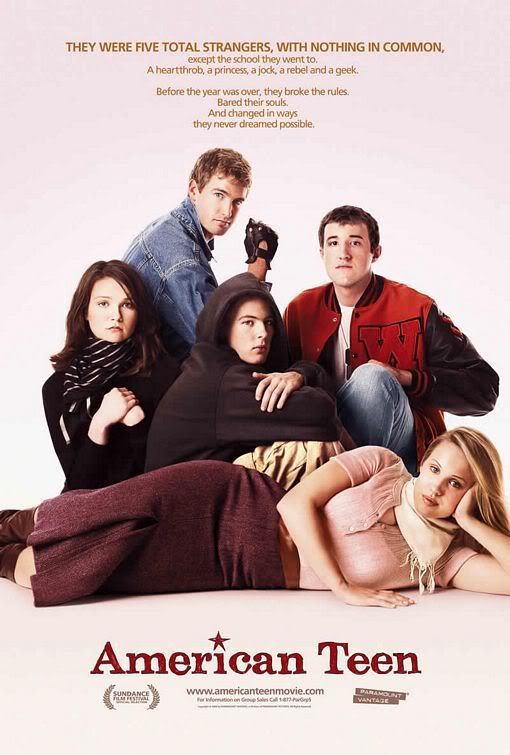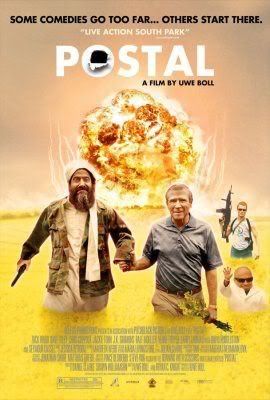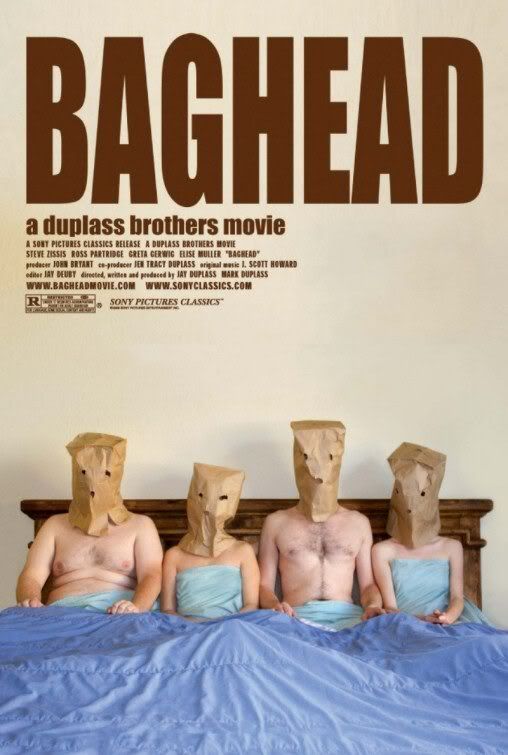Saturday, May 31, 2008
Thursday, May 29, 2008
Sundance at BAM Opening Night: American Teen

Once again the Sundance Film Festival has come to Brooklyn for a week of narratives, documentaries, short films, and music, and apparently a few art exhibits. I have several tickets to films playing this year-some of them coming out in the next few weeks, and some of them without a distributor yet, but no matter the case I am sure that it will be like every other festival-some great, some so-so, and some so bad that I would never want to see them again. With the opening night selection of "American Teen" we are already off to a bad start. A few other titles that I'll be seeing in the next few days that could be of interest are the documentary "Man on Wire," the Sam Rockwell dark comedy "Choke," "Frozen River," and "Ballast,"-the latter of which I am looking forward to after a reliable recommendation came my way.
Postal

Film fans, video game fans, and even Ed Wood fans have heard the name Uwe Boll, perhaps the worst living director out there right now, but certainly one that has a lot of faith in himself. I haven't seen a film by him since 2003 when I subjected myself to the awful zero star film "House of the Dead," which ended up being the worst film of that year, and perhaps one of the worst films ever made. He followed those up with "Alone in the Dark," "Bloodrayne," and lastly "In the Name of the King: A Dungeon Siege Tail," which all barely made any money and barely generated any fair reviews let alone good ones. He's angered film fans with his bad movies, and angered video games fans with his bad adaptations. There is even an online petition where he claims if he gets a million names he will stop making movies forever. But seriously, watch some kind of interview with him-he really thinks he is something special, and it is very very funny.
Well, Boll has mixed things up a bit here with "Postal," another video game adaptation, but its a straightforward comedy. An offensive, loud, bloody, and very un-PC comedy, which, I will admit, actually did manage to make me laugh at some points. "Postal" is a bad film, but not nearly as bad as "House of the Dead" in that it is such a trainwreck of a film that some of it actually seems to work in an insanely twisted way. The first scene depicts two terrorists on the plane on September 11th debating on how many virgins they will get in the afterlife, until they just decide to land in the Bahamas, until the passengers end up bringing the plane down into the towers. If that makes you look at the screen in disgust, than this clearly isn't the movie for you. We are then brought to Paradise, a trailer trashed little town where our main characters-billed as Postal Dude-is going to an interview, while his rather rotund and adultery prone wife yells at him. Postal Dude is obviously about to go. . .well, you know where, until he is approached by his cult leader Uncle Dave (played by Dave Foley) to help him rob an amusement park, as both of them are in need of some money. They plan to rob the park of a bunch of dolls, which the Taliban is actually intending on stealing to put vials of some kind of disease to spread around America-a way to spread terrorism without actually killing any of their own.
You would really have to walk into "Postal" knowing what you are in for-and it really does apporach "so awful that it is tolerable status." Pretty much every aspect of this movie is awful-much of the acting (including a cameo by Verne Troyer as himself) is just awful, although Dave Foley manages to actually turn in something decent here, which is understandable as he just is so naturally funny. The lighting is overly bright, the music is just painful to the ears. But the ridiculous nature of some the jokes are oddly humorous. Even though he is a mass murderer and an awful man, the concept of bin Laden going to self-help meetings to work on issues of anger is oddly amusing. This really is a bad movie, but it is fun to watch, especially in a crowd that laughs when the words "A Uwe Boll Film" come up.
The reason why I even went to see "Postal,"-the first film of Bolls that I actually gave money too, and this is having a hard time breaking the 5,000 barrier-is because of the story behind it. The film has been pushed back and back and back, and it was going to be set for a wide release last Friday, to go against "Indiana Jones and the Kingdom of the Crystal Skull." But at the last minute the 1,500 screen release was reduced to a mere 13, and the only place in all of New York State that you can find "Postal" is the Cobble Hill Cinemas, a small little theatre in Brooklyn that I haven't even been to since 2004. As for Boll, I will say that I did not sign his petition-I just couldn't. First of all, he is doing what he loves to do, and he is such an interesting character to follow that we has already written himself in the history books. We have a man here who appears in the middle of his own movie as himself, makes fun of himself, proclaims to the creator of the "Postal" video game that the movie we are watching is great, and than ends up getting shot in the testicles, and folks want to get RID of him? A character like that? But, unless something generates as much talk or humor as the story of getting "Postal" into theatres did, I think I have seen my last film by him.
Final Grade
** of ****
Wednesday, May 28, 2008
The Chronicles of Narnia: Prince Caspian, The Edge of Heaven, Redbelt, The Children of Huang Shi
OSS 117-Cairo-Nest of Spies, Priceless, Noise, Reprise, Roman De Gare, Sangre De Mi Sangre
Sunday, May 25, 2008
Iron Man, Speed Racer, The Fall
Friday, May 23, 2008
My Blueberry Nights, Fugitive Pieces, Stuff and Dough, Then She Found Me
Monday, May 19, 2008
My Father My Lord

I was honestly quite surprised by how much I was effected by "My Father My Lord," perhaps one of the smallest movies I've seen in a while. David Volach' directorial debut is a quiet affective family drama, centering around a family of three where religion is the central focus. Although it in the end, it is the message that religion should not be the most important thing with any family. We follow the story through the eye of Menaham, a young boy who lives under the stern religious following his his Rabbi father. His father does love him, but in this lifestyle, it is religious practice which must come first. A scene where Menaham's mother instructs him to go into the living room to speak to his father is very telling in that his father never says a word to him as he reads his religious templates. The film moves along its very thin 72 minutes almost plotless, until a trip to the Dead Sea culminates in a tragic accident.
Baghead

"Baghead" is the new film by the Duplass Brothers, and if you have absolutely no idea who I am talking about when I say that, hopefully in the near future you will. They impressed me quite a bit with their film "The Puffy Chair" about two years ago, and they continue to impress me with the slightly better "Baghead," which is already being marketed all wrong based on the single trailer I've seen for it. "Baghead" is, at its core, a relationship comedy, with elements of horror sprinkled into it. It has pretty much the same tone as "The Puffy Chair," and even similar characters, only its in a mild horror setting. Based on the marketing it seems like Sony is trying to get this out as your typical "four people in the woods" type of movie, with laughs thrown in to tell people they are going to have a good time. And I suppose, if you really want, you can call "Baghead" one of those "mumblecore movies," that so-called genre of film making that really isn't picking up as much as Andrew Bujalski would hope. You can read more about that movement here. But I did not consider the Duplass' last film a mumblecore movie nor do I consider this one one, despite it having similar styles.
"Baghead" avoided being everything I had expected it to be, but in an extremely good way. I left the theatre extremely satisfied with what I saw, and I really loved everything about it. I loved the characters, their situations, and the final scene which just reached an unexpected note of poignancy, on the same level that 'The Puffy Chair" ended-these are two very abrupt endings (no fade-outs, no real hint of the film about to be over at all), but both end their films on such perfect notes. I walked out of the theatre not only happy to have seen the film, but happy that there is a contentment within this group of characters-as if they were my own friends that I just spent 85 minutes with.
This is the aim of Andrew Bujalski's movement-to make movies with characters so natural and real that it gives the viewer the impression of being out with their friends. But his movies obviously want to be that-they reek of pretentiousness and simply try to hard. But without trying as hard, the Duplass Brothers made these natural characters that I WANTED to be around. The film just reminded that there is hope-hope in love, hope in life, and even hope in good independent film making. This is one of my personal favorite films of the year at this point.
